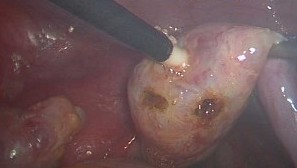PCOS & Obesity: Fertility and Health Issue
PCOS, known as Polycystic Ovary Syndrome, is considered as a congenital organic disease of the ovary, that causes a chronic endocrine imbalance, leading to several symptoms that affect fertility and potentially leads to infertility. When observed with an ultrasound or laparoscopic diagnostics, the ovary will appear to have several cysts growing. These cysts are maturing follicles within the ovary, that are all developing simultaneously which can cause the swelling of the ovary. The clinical manifestation of PCOS is mainly hyperandrogenemia, ovulation disorders and affects the metabolism of glucose and lipids. Over time, if left untreated, it can lead to cardiovascular disease, diabetes, and fatty liver.
Here at Antai Hospital, we have identified that the root cause of PCOS is due to the presence of Leydig cells within the ovaries, that is causing a hormonal imbalance (excessive secretion of testosterone) and simultaneously causing multi-follicular maturation. Eventually they become cysts and disrupts the ovulation process.
It is one of the most common endocrine disorders that affects women.
Symptoms
- Amenorrhea
- Skipped periods
- Inconsistent periods
- Anovulation
- Acne
- Obesity
- Hirsutism
- Insulin resistance
- Diabetes
PCOS in-relation to Obesity
Obesity is frequently associated with glucose intolerance, insulin resistance, dyslipidemia, and hypertension. The clustering of these risk factors is usually referred to as metabolic syndrome. Many of the abnormalities of metabolic syndrome overlap with those of PCOS, and it is, in this case, the obesity is a result of chronic PCOS. Namely, hyperinsulinemia and glucose intolerance.
In addition to the negative impact of obesity and insulin resistance on female fertility, metabolic disorders can directly or indirectly affect the fertility of women by influencing either pituitary-hypothalamic function or ovarian function. In particular, both type 1 and type 2 diabetes mellitus (DM) have been associated with undesirable effects on the women’s reproductive axis. Individuals with DM and primary and secondary amenorrhea exhibit low levels of estradiol, luteinizing hormone (LH), and follicle stimulating hormone (FSH), which have mostly been associated with a lack of residual insulin secretion and poor metabolic control. Furthermore, the “glucotoxicity” effect of chronic hyperglycemia on the neurons of the hypothalamus can be responsible for reduced LH response to gonadotropin-releasing hormone (GnRH) stimuli.
Hyperglycemia also affects ovarian function in women. Elevated blood glucose levels trigger peripheral insulin resistance. In addition, hyperglycemia can also affect ovarian function via the accumulation of advanced glycation products. Collectively, nutrients, especially glucose availability, are crucial metabolic regulators of reproductive function.
PCOS Examination at Antai Hospital
- Examination on menstrual changes
- Blood Test
- Basic endocrine LH/FSH≥0 by electrochemiluminescence immunoassay
- Vaginal 4-dimensional color doppler ultrasonography to identify polycystic changes in ovarian follicles
PCOS Treatment at Antai Hospital
Polycystic ovary syndrome (PCOS) is mainly characterized by hyperandrogenemia and ovulation disorder, and it can be categorized into more than ten different types, clinical manifestations are different as well: infertility, miscarriages, irregular menstruation, obesity, hirsutism, acne, mood instability. The hospital discovers this disease is an error in the gonadal constitution, causing the presence of Leydig cells within these ovaries. Our doctors will skillfully pinpoint the locations of these abnormal tissues within the ovaries and remove them surgically using 3D-Laparoscopy. We also conduct a sleeve gastrectomy to assist with the weight reduction and treat the obesity.
Upon recovery, patient will experience regular menses, and hyperandrogenemia symptoms will subside quickly. Fertility is also restored, and patients can go on for full term, healthy pregnancies.
Antai Hospital’s Commitment
Antai Hospital’s full refund policy for the miscarriage prevention treatments we provide should already be the best guarantee for a healthy pregnancy. Patients should rest assured, can and should go about their everyday life, focusing their diet on vegetables, beans, celery, and other fiber-rich foods. Besides that, an active lifestyle of yoga and swimming should also be incorporated to help relieve stress and increase blood circulation, which is beneficial for the fetus’s development and the mother’s health. With our assurance, a healthy lifestyle, and peace of mind, you can go through a healthy pregnancy with no complications.
Recurrent miscarriages are no doubt a heavy blow to the patient’s physical and mental health. All we can do is to help ease the burden and decrease your trauma, to slowly help you overcome the anxiety with the love and care that we provide at Antai Hospital.
Trust in Antai Hospital and trust in yourself, your pregnancy is our priority.
